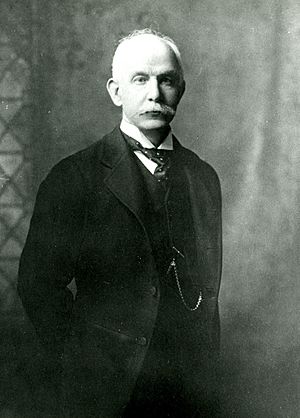Brooks Adams facts for kids
Quick facts for kids
Brooks Adams
|
|
|---|---|

Adams, photographed in 1910.
|
|
| Born | June 24, 1848 Quincy, Massachusetts, United States |
| Died | February 13, 1927 (aged 78) Boston, Massachusetts, United States |
| Occupation | Historian |
| Nationality | American |
| Alma mater | Harvard College Harvard Law School (did not graduate) |
| Spouse | Evelyn Davis |
| Parents | Charles Francis Adams Sr. Abigail Brown Brooks |
| Relatives | John Quincy Adams (grandfather) Peter Chardon Brooks (grandfather) John Adams (great grandfather) Henry Cabot Lodge (brother-in-law) |
Peter Chardon Brooks Adams (June 24, 1848 – February 13, 1927) was an American attorney, historian, political scientist and a critic of capitalism.
Contents
Early life and education
Adams was born in Quincy, Massachusetts, on June 24, 1848, son of Charles Francis Adams and Abigail Brown Brooks. He attended schools in the United States and in Europe.
Adams was a great-grandson of President John Adams, a grandson of President John Quincy Adams, the youngest son of U.S. diplomat Charles Francis Adams, and brother to Charles Francis Adams Jr. and Henry Adams. He was a philosopher, historian, and novelist, whose theories of history were influenced by his work. His maternal grandfather was Peter Chardon Brooks, the wealthiest man in Boston at the time of his death.
He graduated from Harvard University in 1870 and studied at Harvard Law School in 1870 and 1871. Adams was secretary to his father in Geneva, in 1872, where the latter was an arbitrator upon the Alabama claims, under the "Treaty of Washington." He was admitted to the bar in 1873, practiced law in Boston until 1881, and then devoted himself to literary work.
Social theories
Adams believed that commercial civilizations rise and fall in predictable cycles. First, masses of people draw together in large population centers and engage in commercial activities. As their desire for wealth grows, they discard spiritual and creative values. Their greed leads to distrust and dishonesty, and eventually the society crumbles when a new, more economically energetic society takes its place.
In The Law of Civilization and Decay (1896), Adams noted that as new population centers emerged in the west, centers of world trade shifted from Constantinople to Venice to Amsterdam to London. This work has been compared to the later, longer works Decline of the West (1918) by Oswald Spengler and A Study of History (1934–61) by Arnold Toynbee.
Adams predicted in America's Economic Supremacy (1900) that an "Anglo-Saxon alliance" would arise in opposition to China and that New York City would become the center of world trade.
Personal life
In 1889, Adams married Evelyn Davis, the daughter of Admiral Charles Henry Davis. They did not have children. Evelyn Davis's sister Anna was the wife of Henry Cabot Lodge. Her sister Louisa was the wife of John Dandridge Henley Luce, the son of Stephen Luce.
Brooks Adams hired Wilhelmina Harris as social secretary for himself and his wife in 1920. Harris lived with and worked for them until both Brooks and Evelyn died.
Recognition
He was elected a Fellow of the American Academy of Arts and Sciences in 1918.
Legacy
Brooks Adams was the last Adams family member to live at Peacefield. After Adams's death, in accordance with his wishes, the house became a museum, first run through the family and then later by the National Park Service. Today, Peacefield is part of Adams National Historical Park.
Portraits
Family tree
|
||||||||||||||||||||||||||||||||||||||||||||||||||||||||||||||||||||||||||||||||||||||||||||||||||||||||||||||||||||||||||||||||||||||||||||||||||||||||||||||||||||||||||||||||||||||||||||||||||||||||||||||||||||||||||||||||||||||||||||||||||||||||||||||||||||||||||||||||||||||||||||||||||||||||||||||||||||||||||||||||||||||||||||||||||||||||||||||||||||||||||||||||||||||||||||||||||||||||||||||||||||||||||||||||||||||||||||||||||||||||||||||||||||||||||||||||||||||||||||||||||||||||||||||||||||||||||||||||||||||||||||||||||||||||||||||||||||||||||
| Notes: | ||||||||||||||||||||||||||||||||||||||||||||||||||||||||||||||||||||||||||||||||||||||||||||||||||||||||||||||||||||||||||||||||||||||||||||||||||||||||||||||||||||||||||||||||||||||||||||||||||||||||||||||||||||||||||||||||||||||||||||||||||||||||||||||||||||||||||||||||||||||||||||||||||||||||||||||||||||||||||||||||||||||||||||||||||||||||||||||||||||||||||||||||||||||||||||||||||||||||||||||||||||||||||||||||||||||||||||||||||||||||||||||||||||||||||||||||||||||||||||||||||||||||||||||||||||||||||||||||||||||||||||||||||||||||||||||||||||||||||
Works
- The Emancipation of Massachusetts: The Dream and the Reality, Houghton Mifflin Company, 1919 [1st Pub. 1887].
- The Gold Standard: An Historical Study, Alfred Mudge & Son, 1894.
- The Law of Civilization and Decay: An Essay on History, The Macmillan Company, 1895.
- America's Economic Supremacy, The Macmillan Co., 1900.
- The New Empire, The Macmillan Company, 1902.
- Railways as Public Agents: A Study in Sovereignty, Boston, 1910.
- Theory of Social Revolutions, The Macmillan Company, 1913.
Essays
- "The Spanish War and the Equilibrium of the World," The Forum 25 (6), August 1898.
- "The New Struggle for Life Among Nations," McClure's Magazine 12 (6), April 1899.
- "England's Decadence in the West Indies," The Forum, June 1899.
- "War and Economic Competition," Scribner's 31 (3), March 1902.
- "John Hay," McClure's Magazine 19 (2), June 1902.
- "Legal Supervision of the Transportation Tax," The North American Review, September 1904.
- "Nature of Law: Methods and Aim of Legal Education." In: Centralization and the Law: Scientific Legal Education. Boston: Little, Brown & Company, 1906.
- "Law Under Inequality: Monopoly." In: Centralization and the Law: Scientific Legal Education. Boston: Little, Brown & Company, 1906.
- "A Problem in Civilization," The Atlantic Monthly, Vol. CVI, 1910.
- "The Collapse of Capitalistic Government," The Atlantic Monthly, Vol. CXI, 1913.
Other
- Henry Adams, The Degradation of the Democratic Dogma, with an introduction by Brooks Adams. New York: The Macmillan Company, 1919.



